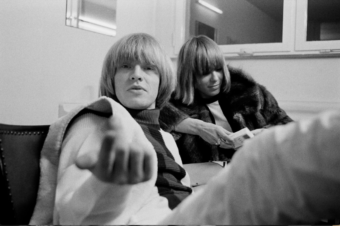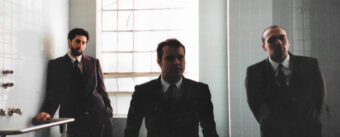What is a Jens Lekman? It doesn’t come in any of the usual colors or shapes. It bristles with complicated angles and mechanisms. It’s hard to immediately say what it does, but it’s so appealingly packaged you want to buy it on sight. It’s a Rube Goldberg contraption made of tinsel and tulle, pinwheels and joy buzzers, duty-free perfume and lavender incense. It spits out isotopes of perfectly eccentric Jens-ness, a rare element that flusters forms, toys with tastes, blithely scrambles cultural registers. The more you describe it, the sketchier it sounds, and this is closely related to what makes it so great.
In a bespoke version of his native Sweden’s romantic-melancholic indie-pop, Lekman upholsters the requisite peppy guitars with glossy samples, pianos, and strings, power-clashing plush tones that distantly murmur of yacht rock and world music, exotica and adult contemporary. He’s a Scandinavian Carmen Sandiego dispatching from Gothenburg and Melbourne and Berlin, crooning well-rehearsed anecdotes in a tenor like expensive lotion. His knowing naïveté has shades of The Magnetic Fields’ Stephin Merritt and The Lucksmiths’ Tali White, but Jens sticks stubbornly in his own category, outlined by his flashing wit, droll charisma, and big world-wandering heart. It’s describable only by additive absurdity—here, he’s like an Afro-funk Paul Anka, there, a postmodern Paul Simon or Balearic beat Boz Scaggs.
While much of Swedish indie-pop traffics in allegiant cut-paper vignettes, Lekman sets his ideas about distance and desire in specific, sharply observed social scenes, where they find shape and traction. This remains so on Life Will See You Now, his first new LP in more than four years, but there is also something different about it, as if during his quiet stretch a slow flame burned away some chatty residue, revealing the clear stripes of a purpose shining below. Following a delightfully snarky EP (2011’s An Argument with Myself) and a self-obsessed study in apocalyptic heartbreak (2012’s I Know What Love Isn’t), it’s a generous, pacifistic record about the dynamics of friendship and the grace of listening—both, however coincidentally, apt palliatives for a tense, hostile global moment.
Not that Jens skimps on pure romantic fancywork. He always furnishes his transcendent themes with small bourgeois comforts—little shampoo bottles and scented candles, bowls of avocados and figs. Encountering his music at its schmaltziest feels like stumbling across an Ikea in a rainforest, the forms sleek, modular, efficiently designed, the setting incongruously florid. “What’s That Perfume That You Wear?” is nothing but irresistible disco-pop bougainvillea, as Lekman lingers in a moment of anticipation, vibing to steelpan wizard Ralph MacDonald and rhapsodizing about how good sandalwood smells. And in the Jens-centric cosmology of “How We Met, the Long Version,” which samples another deep cut, Jackie Stoudemire singing “Don’t Stop Dancin’,” the Big Bang blasts out all those trilobites and Bonobos solely to contrive a single starlit kiss.
Lekman’s best songs are as close to musical theater as pop. His phrasing is full of conversational nuance, his timing dramatic and comic, the arrangements like lavish scenery. He’s one of those directors who loves to cast himself, appearing alternately as a hapless daydreamer, a crusader for love, and a merry wanderer of the night. On “Waiting for Kirsten,” he bemusedly tracked Kirsten Dunst around his hometown as she filmed Melancholia with Lars von Trier. In “A Postcard to Nina,” from his first truly great album, 2007’s Night Falls Over Kortedala, he starred in a five-minute sitcom about posing as a friend’s boyfriend at a Meet the Parents-like dinner so she could be with her girlfriend. “Yours truly, Jens Lekman,” he signed off, taking a bold move from Leonard Cohen.
We meet him right away on “To Know Your Mission,” Life Will See You Now’s first song. It’s 1997, and a Mormon missionary in Gothenburg encounters a teenager “who takes his headphones off and introduces himself as Jens.” The Mormon’s a stand-in for existential certainty, and Jens considers his own. He’s not sure his songs are any good; maybe he’ll be a psychiatrist, or a social worker, like his dad. “I just want to listen to people’s stories,” he realizes. The tempo speeds way up and then slows way down, like time flowing around an epiphany, which arrives in the present tense: “I’m serving you.” It’s the first time Lekman has so clearly defined the organizing ethics always hinted at in his music: that people are funny, listening to them breeds empathy, empathy breeds love, and love is the highest service to the world.
Throughout the album, Lekman precisely measures the distances of intimacy in order to narrow them, and platonic love gets as much play as romantic. In “Evening Prayer,” while saluting a friend who carries around a 3-D printed model of his tumor, he pauses to confide to us, “It’s been a long hard year/ For a friend who’s not sure if he’s close enough/ To be allowed to care.” And “How Can I Tell Him” is a touching portrait of the awkward alchemy of love between male friends, concluding, “Before he’s gone, he shouts, ‘Later, dude!’/ I think ‘Yeah, I love you too.’” Lekman, expert with displaced feeling, bottles it again in “Our First Fight,” a lovely little sliver of a relationship arc where, muzzled in TV talk on a group date and fuming over a tiff, he blurts out, “No, I haven’t seen season three!” with comically disproportionate passion.
Of course, “In a world of mouths, I want to be an ear,” as Lekman would have it on “To Know Your Mission,” is a pretty rich thing for someone singing so lushly to say, which lures us back to the essential slipperiness of Jens. Sometimes his music feels like it’s exactly what it seems to be, and sometimes it feels like it’s something else, pretending, in a disguise—a funny one, with an obvious fake mustache. The luxe, blow-dried tone always seems to conceal a secret laugh, at itself or the world, and a pang of the rawest earnestness. Is it an ironical setting of candor or a candid setting of irony? The trick is that it’s both. The avidly overacted gestures of sincerity, performed with an arched brow, can sneak the genuine article past lowered defenses. Hardly anyone else can pull this kind of therapeutic sneak attack like ours truly, Jens Lekman.





